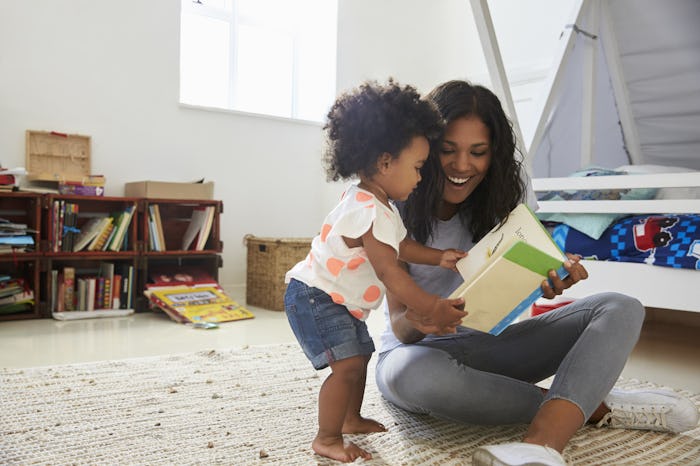Life
Study: Reading With Your Toddler Benefits Their Development In More Ways Than You Think
Bedtime routines aren't always easy when you have a toddler, namely because they often entail reading the same story over and over again until you feel like a hostage to a tiny little dictator that somehow lives in your home. But the next time you feel like tossing your kid's favorite book out lest you have to read it for the umpteenth time while they stall on light's out, try to remember that reading with your toddler benefits their development in more ways than you might even know, as this new study has found. So, while frustrating sometimes, it's totally worth making reading part of the routine.
A new study out of the University of Hong Kong's department of social work and social administration evaluated 19 prior studies on reading to kids up to the age of 6 among over 3,000 families. The researchers found that it's not just good for their language and verbal skills, but that there were also "positive effects for both sides in so-called psychosocial functioning, which includes mental well-being, emotions, behavior and relationships with others."
Qian-Wen Xie, a lead author on the study, which was published in Pediatrics, said in a statement to MedicalXpress, "Now we feel more confident to say that reading to children is good for their social and behavior skills. Reading with children is not only for having a smart child, but also for having a happy child and a good parent-child relationship as well."
Caroline Kistin, a pediatrics researcher at Boston University School of Medicine who wasn't involved in the study, spoke about the study's conclusions to Business Insider. She said that "shared reading supports child cognitive development, helps children develop the ability to pay attention and cooperate, and serves as a bonding opportunity for parents and children."
So it's great if your kids are flipping through a book on the floor while you make dinner, but finding some time in the day — or even week — to make reading a special activity might do some good. Kistin added, according to Business Insider:
The shared experience — spending time together, sitting close to each other, making connections between the book and daily life — are critical. The findings from this study highlight that the time spent reading together also improves parents' wellbeing and is associated with decreased stress, decreased depression, and increased markers of parental competence.
The study didn't find that there was any correlation between the actual amounts of time parents and kids spent reading together, but all of the studies evaluated had a control group of parents who were given supplies and training about reading to kids and those did not.
Which is an important thing to note. Books are not cheap, which means that some families struggle to provide for their families might sacrifice buying some board books to read at night for other necessities. Parents working multiple jobs or in places where the libraries are underfunded by the federal government and lack private grants might struggle to find the supplies and time to make reading a priority.
According to a 2007 study, only 40 percent of children living in poverty were read to regularly, compared to 50 percent of children who lived in homes that made 100 to 199 percent above the poverty line, and 65 percent of kids who lived at 200 percent and above.
Which only means that supporting low-income families with resources like books and educating parents about the benefits of reading above language and verbal skills is all the more necessary. Learning that books are special, how stories work, and that reading is something to be done for fun, which are all toddler reading milestones according to PBS, are skills that kids will use way beyond their toddler years.
So even though reading Goodnight, Moon 16,000 times every night might make your brain explode, it's definitely a privilege. And it's really good for your kid, too, so it's definitely worth it.
Check out Romper's new video series, Bearing The Motherload, where disagreeing parents from different sides of an issue sit down with a mediator and talk about how to support (and not judge) each other’s parenting perspectives. New episodes air Mondays on Facebook.
